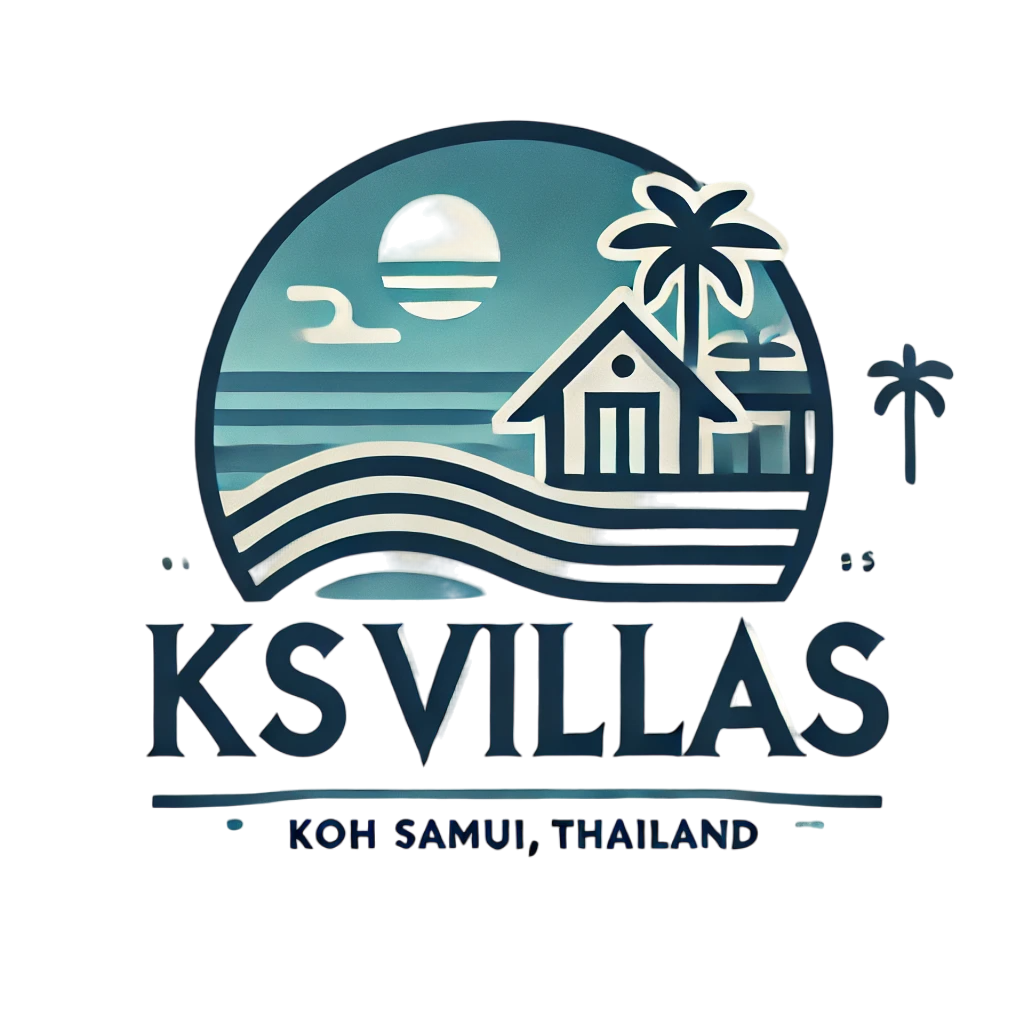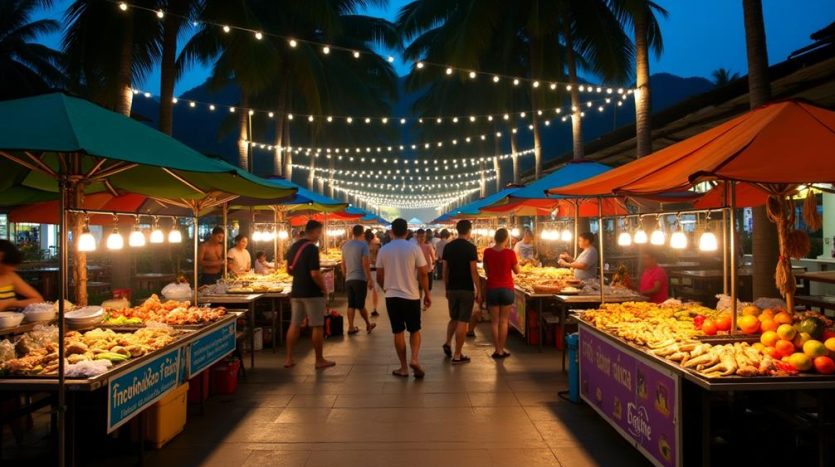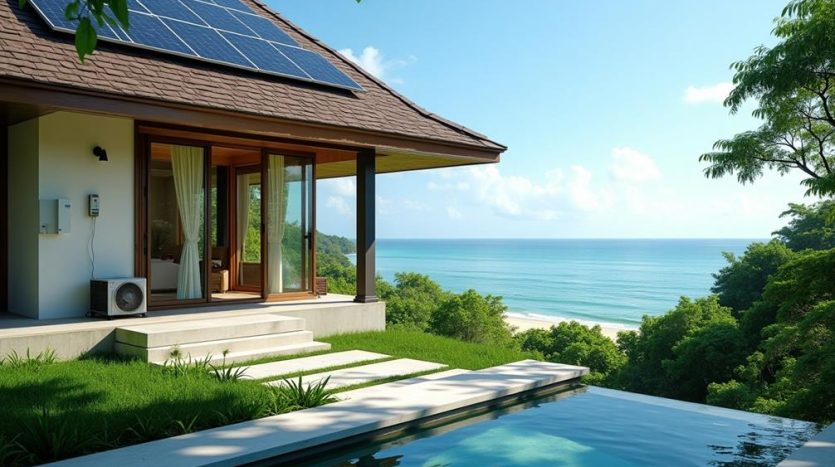Is It Expensive to Live in Koh Samui?
Think of living in Koh Samui as traversing a financial tightrope; it can sway between affordable and extravagant based on your choices. You'll find housing options ranging from modest apartments in Mae Nam to opulent villas in Chaweng. Grocery bills can be kept low if you shop at local markets, though supermarkets will stretch your budget. Dining out varies widely, while scooter rentals make transportation relatively cheap. Yet, utility costs, especially electricity, might surprise you. Curious about how to balance these expenses for a comfortable life on the island?
Key Takeaways
- Housing Costs: One-bedroom apartments range from $250 to $500 per month, depending on the neighborhood.
- Grocery and Dining: Local markets offer cheaper groceries; street food is affordable, while fine dining can cost up to $45 per meal.
- Transportation: Scooter rentals are economical at $6-$10 per day; limited public transport options available.
- Utilities: Monthly electricity bills range from $100 to $200, and internet services cost around $30-$60.
- Healthcare: Affordable healthcare with a mix of modern hospitals and traditional practices; health insurance is recommended.
Housing Costs
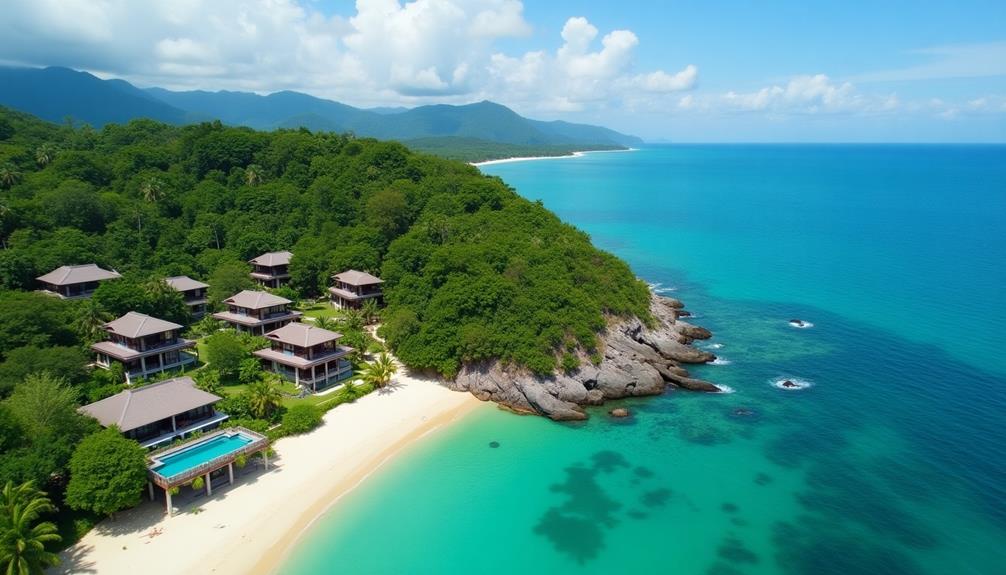
Housing costs in Koh Samui can vary considerably depending on your preferences and lifestyle. If you're eyeing the property market, you'll find a range of options from luxury villas to modest apartments.
Rental trends show that a one-bedroom apartment in the heart of Chaweng might set you back around $500 per month, while a similar unit in quieter areas like Mae Nam could be about half that amount. Keep in mind that zoning regulations may affect where and how you can build or buy property.
Different housing styles offer various amenities. Fancy a beachfront bungalow or a hillside villa with a pool? Those come with a heftier price tag, but the views are worth it. For a more budget-friendly option, townhouses and condos abound.
Neighborhood comparisons are essential. Chaweng and Lamai are bustling with nightlife and shopping, ideal for social butterflies. Meanwhile, Bophut and Choeng Mon offer tranquility, appealing to expatriates seeking a quieter life.
Investment opportunities in Koh Samui are growing. Property taxes are relatively low, making it attractive for long-term investments.
Expatriate living is quite popular here, with many finding the cost of living more manageable compared to Western countries.
Grocery Expenses
When it comes to grocery expenses in Koh Samui, you'll find that costs can vary based on where you shop and what kind of products you prefer. Local markets generally offer lower food prices, especially for seasonal produce, which can greatly cut down your cooking costs. However, if you have specific dietary preferences or lean towards organic options, be prepared to spend a bit more.
Here's a quick comparison to help you gauge the cost differences:
| Item | Local Market Price | Supermarket Price |
|---|---|---|
| Seasonal Produce | $1.50/kg | $3.00/kg |
| Organic Vegetables | $2.00/kg | $5.00/kg |
| Specialty Items | $3.50/unit | $6.00/unit |
The variation in food prices is stark, and buying in bulk can offer further savings. Still, if your culinary adventures require specialty items, those will hit your wallet a bit harder. Cooking costs also depend on whether you love experimenting or stick to the basics.
Dining Out
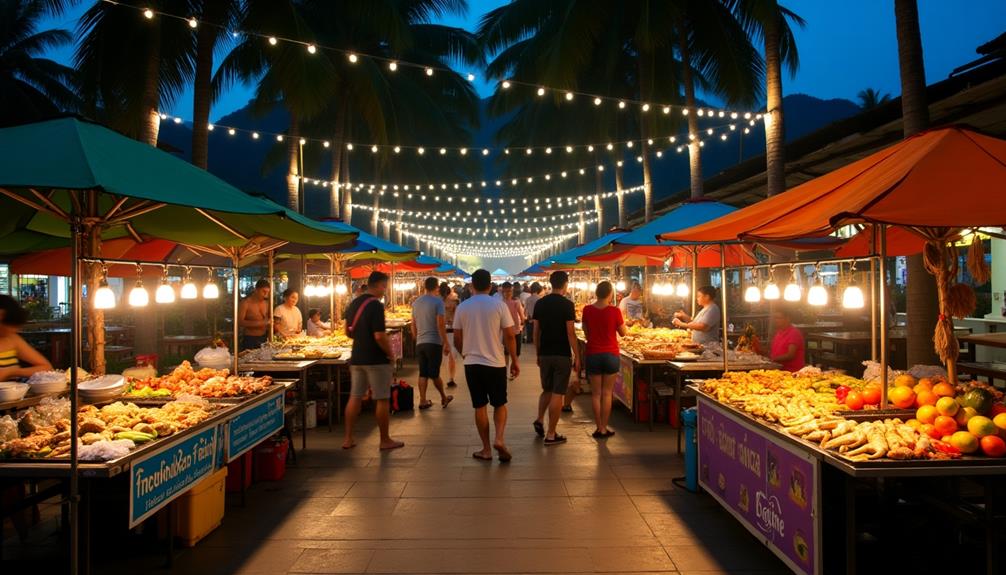
Dining Out
Dining out in Koh Samui offers a broad spectrum of experiences, from budget-friendly street food to high-end restaurants. The island's dining landscape reflects its rich cultural influences, with local cuisine taking center stage. You can savor a plate of Pad Thai from a street vendor for as little as 40 THB ($1.20).
If you're in the mood for fine dining, expect meal prices at upscale restaurants to range between 500-1,500 THB ($15-$45), depending on the sophistication of your palate and perhaps the chef's ego. For those who prefer the convenience of home, food delivery services provide an array of choices at reasonable prices.
Koh Samui's restaurant variety is impressive. You'll find everything from eateries specializing in dietary options like vegan and gluten-free to seafood joints that make you question your life choices. Cultural influences are evident in the diverse dining experiences available, blending Thai traditions with international flavors.
When it comes to dining etiquette, it's generally laid-back, but don't be that person who uses chopsticks to eat rice in a Thai restaurant—forks and spoons are the norm here.
Transportation
When considering transportation in Koh Samui, you'll find a range of options including public transportation, car and scooter rentals.
Public transportation is limited and often less reliable, making rentals a popular choice.
On average, renting a scooter costs around 150-300 THB per day, while fuel and maintenance are relatively affordable.
Public Transportation Options
Public transportation options in Koh Samui are somewhat limited but manageable with proper planning. If you're thinking of hopping on bus services, think again—public buses are virtually non-existent here. Instead, you'll rely mainly on songthaews, which are pickup trucks with bench seating. These can take you to local markets and popular spots, but they don't follow strict schedules.
Taxi fares can add up quickly, with short rides often costing around 200-300 THB ($6-$9). Ride sharing isn't as widespread as you might hope, but apps like Grab can sometimes save the day.
For those adventurous enough to handle the island's unpredictable roads, bike rentals are a budget-friendly option, averaging around 150-300 THB ($4-$9) per day.
Tourist shuttles offer a more comfortable but pricier alternative for getting around, especially for ferry schedules. Speaking of ferries, they're essential if you plan on island hopping. Just remember, they run on "island time," so don't expect Swiss precision.
Travel apps can be your best friend in maneuvering this laid-back chaos. So, while public transport in Koh Samui mightn't be perfect, a bit of planning can turn it into a manageable adventure.
Car and Scooter Rentals
Curious about the cost-effectiveness of car and scooter rentals in Koh Samui? Let's break it down. First off, you've got to decide between a car and a scooter. Scooters are the more fuel-efficient option and easier to navigate through local traffic laws and road conditions. But don't forget scooter insurance and safety gear, especially if you're not familiar with driving on the left side of the road.
Here's a handy comparison:
| Type | Daily Rental Cost | Insurance (per day) |
|---|---|---|
| Scooter | $6-$10 | $2-$3 |
| Compact Car | $20-$30 | $5-$7 |
| SUV | $50-$70 | $10-$15 |
Rental duration plays a huge role. Longer rentals usually get you discounts. Rental agencies often offer a maintenance check before handing over the vehicle—don't skip this step!
Local regulations can sometimes be a bit of a maze, but stick to the basics: wear your helmet, follow traffic laws, and avoid potholes like the plague. With fuel efficiency on your side, scooters often win the battle of cost vs. convenience. Just remember, your driving experience might save you a few bucks—or cost you a few hundred in repairs. Happy scootering!
Fuel and Maintenance Costs
Fuel and maintenance costs can greatly impact your overall transportation budget in Koh Samui. The island's fuel prices are relatively high, so fuel efficiency is vital. Opt for vehicles that are easy on gas and consider eco-friendly options if you're conscious about both the environment and your wallet.
Regular maintenance services are necessary for vehicle longevity, and adhering to maintenance schedules will prevent unexpected repair costs.
To keep your transportation expenses in check, consider these cost-saving tips:
- Choose the right fuel type: Diesel might be cheaper than petrol, but check your vehicle's requirements first.
- Mind your driving habits: Aggressive driving can reduce fuel efficiency, so drive smoothly.
- Regular check-ups: Frequent maintenance services can catch minor issues before they become costly repairs.
Analyzing fuel types and repair costs is necessary to understanding your budget. You can't control fuel prices, but you can control how efficiently you use fuel.
Pay attention to vehicle longevity by scheduling regular maintenance and adopting good driving habits. These strategies will help you save money and keep your vehicle in top shape, ensuring that living in Koh Samui doesn't break the bank.
Utilities
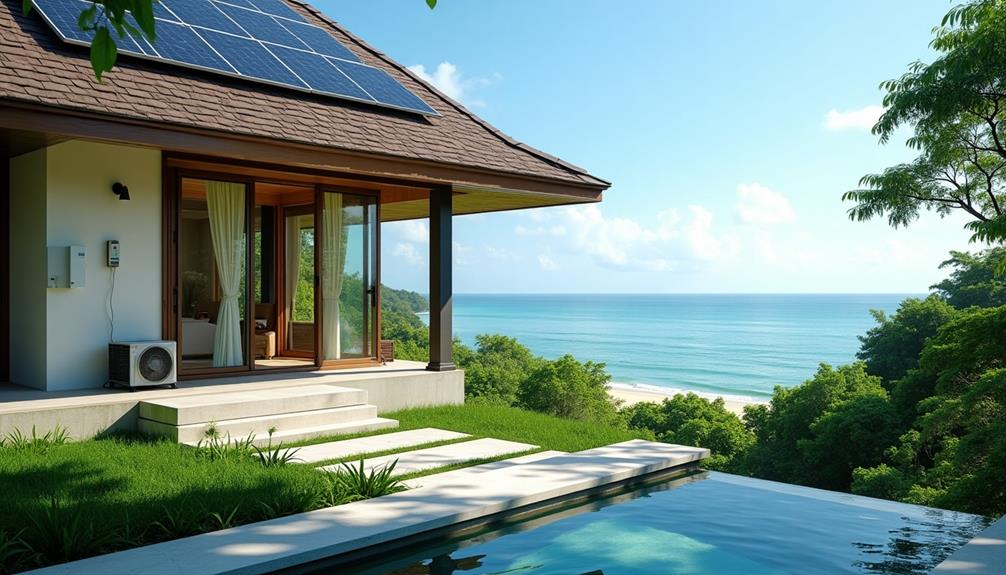
When analyzing the cost of utilities in Koh Samui, you'll find that expenses can vary considerably based on your consumption habits and lifestyle. Utility providers on the island offer a range of services, including electricity, water supply, waste management, and internet services.
Electricity bills can be a significant part of your monthly outflow, especially if you're fond of air conditioning. The good news? Renewable energy options are becoming more available, potentially reducing costs.
Water supply costs are generally reasonable, though the infrastructure quality can sometimes leave you wishing for a rain dance.
Internet services in Koh Samui are surprisingly reliable, with decent speeds at competitive prices. Billing cycles for utilities typically follow a monthly schedule, so you won't be caught off guard.
Waste management is relatively efficient, yet it doesn't hurt to be environmentally conscious given the island's limited resources. Besides, the local amenities such as healthcare facilities and transportation options can indirectly influence your utility expenses.
When doing cost comparisons, keep in consideration that service reliability can fluctuate. During peak tourist seasons, expect a few hiccups.
Healthcare
While keeping an eye on your utility usage is important, understanding the healthcare landscape in Koh Samui is equally essential for a well-rounded cost of living analysis.
You'll find a mix of modern medical facilities and traditional medicine practices that cater to both locals and expats. Here's a quick breakdown:
- Medical Facilities and Clinics: Koh Samui boasts several reputable hospitals and expat clinics, offering a range of services from emergency care to preventative care. Health insurance is advisable to cover these costs, although out-of-pocket expenses can be surprisingly reasonable.
- Wellness and Mental Health: The island is a haven for wellness services, including mental health support. You can easily find yoga retreats, meditation centers, and holistic therapies to keep your mind in tip-top shape.
- Dental and Prescription Services: Dental services are generally high-quality and affordable. Prescription medications can be obtained at local pharmacies, often without needing a prescription, although it's wise to bring your own stash for specific meds.
While the healthcare system is robust, it's not without quirks. Dental services might feel like a spa day, but don't expect the same for emergency care.
Balancing modern and traditional medicine, Koh Samui guarantees you stay healthy without breaking the bank.
Education

Education in Koh Samui offers a varied landscape, catering to both local and expat families. You'll find a range of international schools that provide exceptional educational resources.
These schools often come with higher tuition fees but offer extensive extracurricular activities and language courses, ensuring a well-rounded student life. They also facilitate cultural exchanges, adding a global perspective to education.
If you're considering more budget-friendly options, local schools and online learning platforms are available. These provide solid educational frameworks but may lack the international flair.
Tutoring services are abundant, perfect for customized learning experiences. You can also find scholarship opportunities to ease financial burdens, though competition can be stiff.
Parent support networks are robust, forming communities that help navigate the educational maze. Schools often host events and workshops, making it easier for parents to stay informed and involved.
For families seeking versatility, online learning options are growing, offering flexibility but requiring self-discipline.
Entertainment
Entertainment in Koh Samui offers a dynamic and varied scene that caters to a wide array of interests. If you're considering the costs, here's an analytical breakdown:
1. Beach Activities: You can enjoy snorkeling, jet-skiing, or simply lounging on the sand. On average, renting equipment for a day can cost around THB 500-1,000.
It's crucial to factor in these expenses if you're a beach enthusiast.
2. Nightlife Options: Koh Samui's nightlife is vibrant with multiple entertainment venues. You can find everything from dance clubs to live music bars.
Entry fees for popular spots range from THB 200-500, and drinks can set you back another THB 100-300 each. If you love late-night escapades, this can add up quickly.
3. Cultural Events and Local Festivals: The island hosts numerous cultural events and local festivals, often free or very affordable.
For example, attending a local festival might only cost you THB 50 for some street food. These events offer a budget-friendly way to immerse yourself in local culture.
Objectively, entertainment costs in Koh Samui can vary considerably based on your preferences.
Whether you're into the music scene, movie theaters, or just hanging out at the beach, there's something for everyone—just be ready to balance your budget accordingly.
Fitness and Wellness

When considering fitness and wellness in Koh Samui, you'll find gym membership costs ranging from $30 to $70 per month, depending on the facilities and location.
Yoga class prices vary, typically costing between $10 to $20 per session.
These expenses are essential to factor into your overall cost of living on the island.
Gym Membership Costs
Staying fit and maintaining a healthy lifestyle in Koh Samui involves various costs, particularly when it comes to gym memberships.
You'll find a range of prices based on the gym facilities and services offered. Here's a breakdown of what you can expect:
1. Basic Membership: If you're just looking to use the gym equipment, basic memberships can range from 1,000 to 2,000 THB per month.
These gyms usually offer standard machines and weights but might lack some amenities.
2. Full-Service Membership: For those who want more bang for their baht, full-service memberships range from 2,500 to 4,500 THB monthly.
These gyms often include saunas, steam rooms, and even swimming pools, making it easier to convince yourself that you're not just paying to hold a towel.
3. Personal Training: If you've got fitness goals that need a bit more attention, personal training sessions are available but will cost you extra.
Expect to shell out around 1,000 to 1,500 THB per session. Your wallet might feel lighter, but your muscles certainly won't!
Whether you're a fitness enthusiast or a casual gym-goer, the costs in Koh Samui can fit various budgets while still offering excellent gym facilities.
Yoga Class Prices
For those interested in yoga as part of their fitness and wellness regimen, Koh Samui offers a variety of options to suit different budgets and levels of commitment.
If you're looking for casual drop-in classes, expect to pay around 300 to 500 THB ($9 to $15) per session. Monthly memberships typically range from 3,500 to 6,000 THB ($105 to $180), depending on the studio's reputation and amenities.
Thinking about a more immersive experience? Koh Samui is famous for its yoga retreats and meditation workshops.
A week-long yoga retreat usually costs between 18,000 and 30,000 THB ($540 to $900), often inclusive of accommodation, meals, and additional wellness activities.
For those who want to zen out without breaking the bank, shorter meditation workshops are available, starting at 1,500 THB ($45) for a half-day session.
Miscellaneous Costs
Living in Koh Samui involves a range of miscellaneous costs that can add up quickly, impacting your overall budget.
First off, you'll need reliable internet. Expect to pay around $30-50 per month, depending on speed and data limits.
Clothing expenses can also vary; with the tropical climate, you'll likely buy lighter, breathable fabrics, which can cost anywhere from $10 for a basic shirt to $50 for a fancier outfit.
Personal care items are another consideration. Basic toiletries are affordable, but imported brands can be pricier.
If you have pets, factor in the costs of pet ownership, which include food, vet visits, and grooming.
Home maintenance shouldn't be overlooked either—occasional repairs and upkeep can surprise you.
Here's a quick breakdown:
- Leisure Activities: Beach outings are free, but organized tours can cost $50-100.
- Mobile Plans: Budget for $10-20 per month for a prepaid plan with decent data.
- Travel Expenses: Flights and ferries for off-island adventures can vary widely, especially during seasonal variations.
Insurance premiums, ranging from health to home insurance, also add to your monthly expenses.
Analyzing these costs will help you manage your budget effectively while enjoying the island lifestyle.
